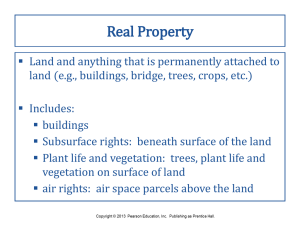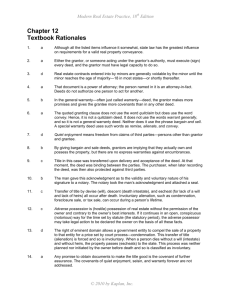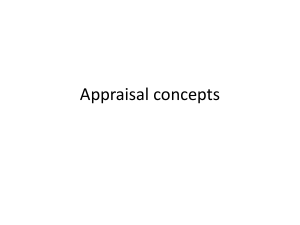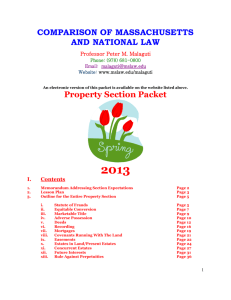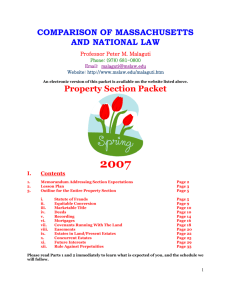Chapter 049 - Real Property
advertisement
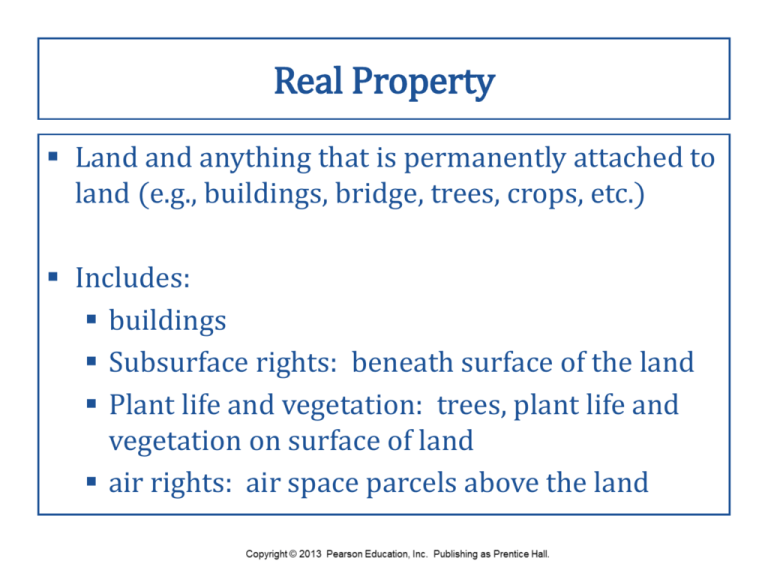
Real Property Land and anything that is permanently attached to land (e.g., buildings, bridge, trees, crops, etc.) Includes: buildings Subsurface rights: beneath surface of the land Plant life and vegetation: trees, plant life and vegetation on surface of land air rights: air space parcels above the land Real Property Fixtures: Goods that are affixed to real estate so as to become part thereof start as personal property become part of real property owned by owner of real property after attached includes: roof added to house, trees that are planted, wall-to-wall carpet, plumbing and electrical fixtures, etc. Estates in Land Ownership rights in real property: Bundle of legal rights that the owner has to possess, use, and enjoy the property Type of estate: Determined from the deed, will, lease, or other document that transferred the ownership rights Freehold Estate Freehold estate: An estate in which the owner has a present possessory interest in the real property with title Highest estate in real estate Freehold Estate Fee simple absolute: fullest bundle of legal rights that a person can hold in real property right of possession for unlimited time; alienable (conveyance or sale); inheritable (devise under will); absolute (nothing cuts off rights) words in deed: “To John Smith and his heirs” or “To John Smith and his blood issue” Freehold Estate Fee simple defeasible: A type of ownership of real property that grants the owner all the incidents of a fee simple absolute except that it may be taken away if a specified condition occurs or does not occur words in deed: “so long as” or “until such time as” grantor could use “restrictive covenant” to restrict in a deed use of real property by grantee Freehold Estate Life estate: An interest in real property for a person’s lifetime; upon that person’s death, the interest is cut off and title is transferred to another party Estate pour autre vie: A life estate that is measured by the life of a third party Future Interests The future (non-possessory) interest that a grantor retains for himself or herself or a third party Reversion: Right of possession returns to the grantor after the expiration of a limited or contingent estate Remainder: ownership goes to a third party upon the expiration of a limited or contingent estate ("remainderman") Remainder: can be “vested” (after life estate) or “contingent” (subject to event of defeasance) Concurrent Ownership Two or more persons own a piece of real property at the same time as co-owners (e.g., both could be co-tenants in fee simple absolute) Concurrent Ownership Tenancy in common: default rule can be equal or fractional (e.g., 60% and 40% instead of 50% and 50%) Deed: “To John and Fred as co-tenants in common” can be sold or left to heirs under a will interest of survivor passes to the deceased tenant’s estate and not to the co-tenants. Concurrent Ownership Joint tenancy: Form of co-ownership that includes the "right of survivorship” upon the death of one joint tenant the deceased person’s interest in the real property automatically passes to the surviving joint tenant or joint tenants equal shares; must be created under a single deed and conveyance Concurrent Ownership Tenancy by the entirety: A form of co-ownership of real property available only to married couples recognized in 25 states (Pennsylvania, Delaware, Maryland, New York, New Jersey, etc.) neither can convey without consent of other upon divorce, reverts to tenants in common Concurrent Ownership Community property: Form of ownership in which each spouse owns an equal one-half share of the income of both spouses and the assets acquired during the marriage regardless of who has title (e.g., Husband has title individually but still owned 50% each) recognized in 9 states (California, Texas, Arizona, Nevada, NM, Idaho, Wisconsin) Concurrent Ownership Condominium: A common form of ownership in a multiple-dwelling building in which the purchaser has title to the individual unit and owns the common areas as a tenant in common with the other condominium owners Cooperative: A form of co-ownership of a multiple-dwelling building in which a corporation owns the building and the residents own shares in the corporation Nonpossessory Interests Nonpossessory interest: person holds an interest in another person’s property without actually having title to any part of the property Easements Easement: Right of limited use (e.g., walking or driving crossing) of someone else’s land. Easement appurtenant: Owner of one property is given an easement over an adjacent property • Servient estate: The land over which an easement is granted • Dominant estate: The land that benefits from the easement Easements Appurtenant Dominant estate 100 Main Street Servient estate 102 Main Street Easements & Non-Freehold Estates Easement in gross: Authorizes a person who does not own adjacent land to use land (e.g., walk or drive across) License: A document that grants a person the right to enter upon another’s property for a specified and usually short period of time Profit-à-Prendre: A document that grants a person the right to remove something from another’s real property Mortgage: Bank’s contingent future interest Non-Freehold Estates Leasehold estate: possession but no title • tenancy for term: specified term of lease • tenancy at will: month to month lease Transfer of Ownership of Real Property Title to real property can be transferred by: Sale (conveyance): The passing of title from a seller to a buyer for a price Deed: The written instrument that conveys an ownership interest in real property • Grantor: The party who transfers an ownership interest in real property • Grantee: The party to whom an interest in real property is transferred Transfer of Ownership of Real Property Types of deeds: General Warranty deed: A deed that protects a grantee of real property from defects in title caused by the grantor and prior owners of the property Quitclaim deed: A deed in which the grantor of real property transfers whatever interest he has in the property to the grantee Transfer of Ownership of Real Property Recording statutes: A state statute that requires a mortgage or deed of trust to be recorded in the county recorder’s office of the county in which the real property is located Quiet title action: An action brought by a party, seeking an order of the court declaring who has title to disputed property Transfer of Ownership of Real Property Marketable title: Title to real property that is free from any encumbrances or other defects that are not disclosed but would affect the value of the property • Title insurance: A form of insurance obtained from a title insurer who agrees to reimburse the insured for losses caused by undiscovered defects in title • Attorney’s opinion: In Delaware, attorney's give legal opinion on good title Transfer of Ownership of Real Property by gift or inheritance recording deed triggers realty transfer tax (usually about 4%, split between buyer and seller) based on sale price or fair market value Adverse Possession Person can obtain title to another's property if certain statutory requirements are met: • Prescribed time period (e.g., 10 or more years) • Open, visible, and notorious • Continuous and peaceful: actual possession • Hostile & adverse (contrary to rights of owner) can count possession by a prior owner Adverse possessor can get title from court in legal action to quiet title

